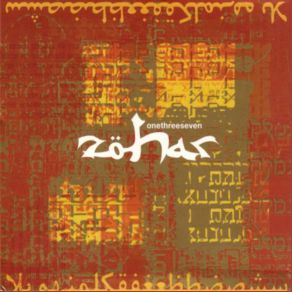Onethreeseven
Download links and information about Onethreeseven by Zohar. This album was released in 2001 and it belongs to Electronica, House, Jazz, Rock, Dancefloor, World Music, Dance Pop genres. It contains 12 tracks with total duration of 01:13:00 minutes.

|
|
|---|---|
| Artist: | Zohar |
| Release date: | 2001 |
| Genre: | Electronica, House, Jazz, Rock, Dancefloor, World Music, Dance Pop |
| Tracks: | 12 |
| Duration: | 01:13:00 |
| Buy it NOW at: | |
| Buy on iTunes $9.99 | |
| Buy on Amazon $8.99 | |
Tracks
[Edit]| No. | Title | Length |
|---|---|---|
| 1. | Ehad | 5:51 |
| 2. | Onethreeseven | 5:55 |
| 3. | Midnight At the Bazaar | 8:37 |
| 4. | Byzantine | 8:41 |
| 5. | Elokainu | 4:34 |
| 6. | Angel | 6:33 |
| 7. | The Merciful One | 5:04 |
| 8. | Head and Bones | 5:06 |
| 9. | Harmony | 4:12 |
| 10. | Maroc | 6:05 |
| 11. | Salaam | 6:52 |
| 12. | Sketches of Egypt | 5:30 |
Details
[Edit]The mystery tour begins even before the CD is cracked and played: Zohar translates to "Sacred Light," and the album's title refers to a Kabbalistic numerical series. The band is built around the talents of Erran Baron Cohen and Andew Kramer, two London-based multi-instrumentalists who are inspired by their common Jewish heritage, plus assorted devotional traditions and Middle-Eastern musical styles. These sources are the epicenter of their kaleidoscopic techno and ambient soundscapes, adding a weighty soulfulness to the antic, fearless, yet oddly respectful amalgams that comprise the album. Sampled and manipulated voices of cantors, muezzins, and groaning Byzantine super-basses are heard, along with fervent exhalations from desert divas Oum Kalthoum and Dimi Mint Abba. The singers emerge from the beat tracks and trance-laden electronica riffs like spirits from an ancient ceremony who have, for some arcane reason, ended up haunting a nightclub and loving it. Sensual acid jazz-flavored trumpet and piano solos add a touch of Pomo lounge sensibility, as if attempting to keep the subtly dangerous incantations of the vocalists at a safe distance. For all its stylishness, this set has little to do with the self-absorbed, groove-over-substance esthetic that characterizes much of the Parisian Buddha Bar canon — even if Zohar did contribute to it. These pieces don't go down nearly so easy and are as much about blissful discomfort as submitting to bold, complicated pleasures. However, for all its confidently luxe, aria-like surge, Zohar remains an act in transition, and one awaits the advent of their next collage with tremendous curiosity.